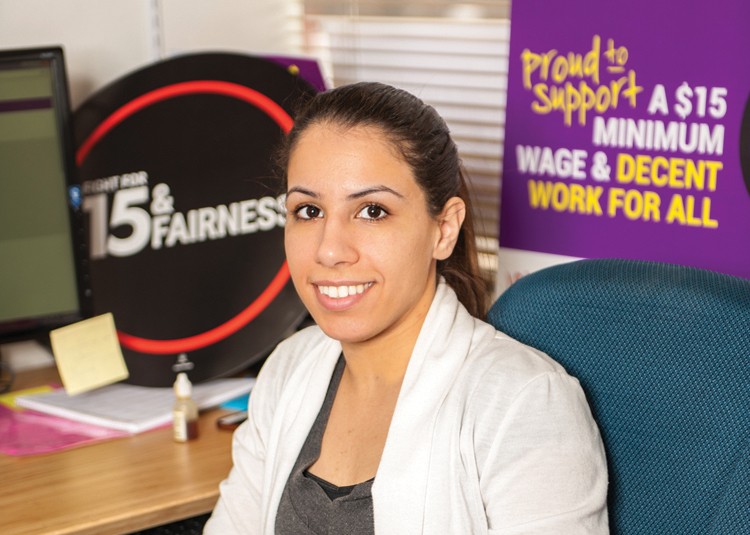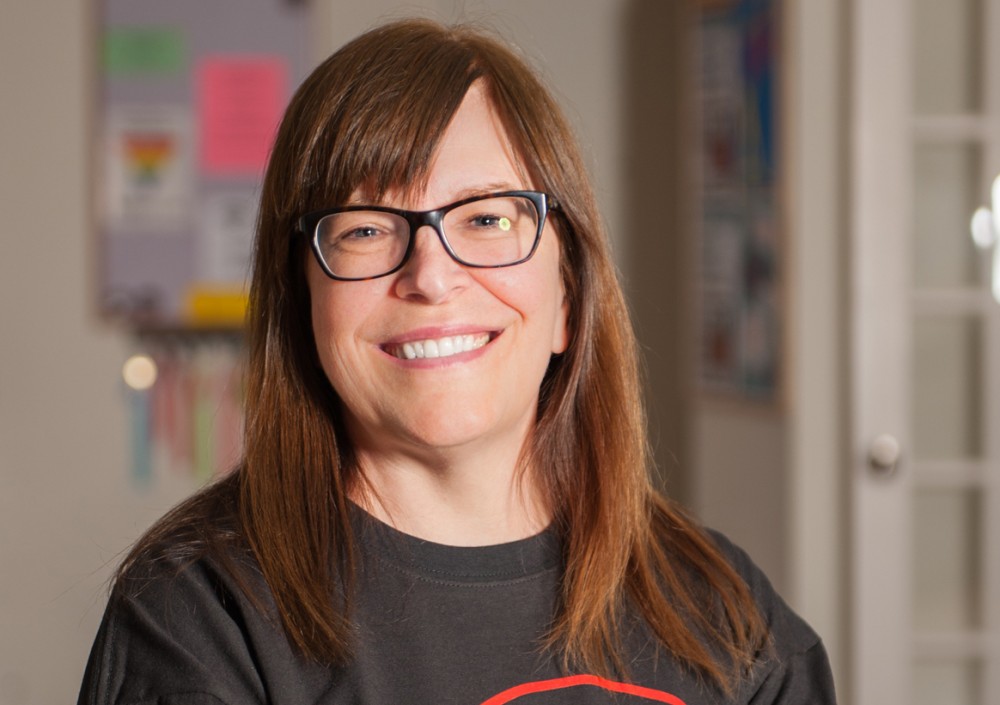Fighting for $15 and Fairness is second nature for Canada's many service-industry employees, who know the impossible struggle of urban life on minimum wage. Individually, they have battled for pay increases, job security, medical insurance, paid sick days, and the other ingredients that make a job a "good job." But when each worker fights this fight alone, any personal gains can come at the expense of co-workers, or at a high cost to the individual.
I've experienced and endured restaurant and retail workplaces where survival meant competitive hostility among employees, as each strove for the best shifts, most hours, that elusive raise, promotion to management, or other perks. Dynamics like those don't spawn a pleasant workplace climate. Informal and unfair choices by owners and managers motivated the decisions that impacted our lives. I was let go at one restaurant after three years, because another server wanted my job to go to her friend. The server was dating the restaurant owner's son at the time.
Can minimum-wage jobs ever incorporate enough fairness for workers to be freed from clashing over crumbs? When the Ontario Legislature passed Bill 148 (the Fair Workplaces, Better Jobs Act, 2017) last November 22, the stage was set for finding out. Under this act, minimum-wage workers received a boost to their paycheques, to $14 per hour effective January 1, 2018, to be followed by an increase to $15, scheduled to take effect January 1, 2019.
In addition, paid and unpaid "personal days" off work became a legal reality in a sector where taking time off is often accompanied by the implied threat of losing one's job. Other changes introduced with the legislation sound suspiciously like examples of basic compassion and common sense:
- a minimum of three weeks' vacation after five years with the same employer
- up to 10 individual days of leave and up to 15 weeks of leave, without the fear of losing one's job when a worker or their child has experienced or is threatened with domestic or sexual violence
- expanded personal emergency leave in all workplaces
- (unpaid) job-protected leave to take care of a critically ill family member.
Knowing one's work schedule in advance is another feature of a fair workplace. Starting January 1, 2019, Bill 148 gives employees the right to refuse a shift they have been assigned with less than 96 hours' notice, eliminating a stressor for the many workers with limited transportation options and multiple roles (for example, those working at more than one job; those who are also students, caregivers and/or parents). These and other changes within the progressive bill are resonating with minimum-wage workers and others who want an equitable employment landscape.
BILL 148 AN INCOMPLETE VICTORY
For Nadira Begum, the passage of Bill 148 is a victory, but an incomplete one. "I have two part-time jobs right now, in the non-profit sector, with no benefits. But now, I can access personal emergency leave; because now, temporary, part-time, casual worker — it doesn't matter," she tells Our Times. "Most of the [Bill 148] changes, I can get access to."
The organizer in Toronto's diverse Regent Park neighbourhood is an advocacy worker focused on "decent work for racialized women." Begum arrived in Canada 12 years ago and found herself unable to land work that made use of her social-work background from Bangladesh. She couldn't afford the time to upgrade her qualifications.
"I had two children, so it was impossible for me to go to university. By this time, I had kind of like part-time work. Before, I had three to 10 jobs at the same time. All of my experience is non-profit sector; I didn't work groceries or other places." Instead, she became a volunteer in Regent Park, and got involved in the Fight for $15 and Fairness in 2016. She is now a leader for the campaign in her community.
Begum says her situation is all too common: Educated immigrants apply for jobs commensurate with their qualifications, but find their credentials unacceptable to employers in Canada. "Lots of people in Regent Park, they face the same conditions. They don't have any choice — they have to do two or three part-time jobs, because their education is not equal here."
For people struggling to support themselves and their families under such conditions, Bill 148 represents a lifeline — Begum says after the first minimum-wage increase came into effect, one woman proudly informed her that she could finally pay her hydro bill.
UNDERPAID WORKERS ARE TREADING WATER
The spiralling cost of living in urban centres means underpaid workers are treading water. There can be no savings, no security when rent alone consumes most of one's income and food banks are a necessary part of life.
News outlets catering to business and corporate interests have chosen to frame systemic injustice as personal inadequacy, notes Pam Frache. The coordinator of the Ontario Fight for $15 and Fairness campaign and Workers' Action Centre organizer is cautiously optimistic about Bill 148's chances of being fully implemented next year. She views the March 10th election of Doug Ford as Progressive Conservative Party of Ontario leader as a potential threat to full enactment, but no insurmountable barrier for the campaign and its supporters.

Nadira Begum speaks with Deena Ladd (left), who has been with the Workers’ Action Centre for over a decade. PHOTOGRAPH: ROSE HA/PHOTOGRAPHY FOR SOCIAL GOOD
What happens when a win for workers is followed by a narrow and controversial win for a politician promising to undo the workers' victory?
"We were concerned, obviously, about the direction of the Progressive Conservative Party in general, just because they already said they were going to prolong the implementation of the $15 minimum wage," says Frache. "In the mid-1990s, the Conservatives not only reversed progressive labour-law changes that had been implemented by the Ontario NDP government [under Bob Rae], they actually rolled back employment standards. They gutted social assistance, [making] literally lethal social-assistance cuts, so we know from their past practices that we need to be concerned."
Those practices have not changed, according to Frache: "We know that the Progressive Conservatives actually voted against Bill 148, which is the bill that brought in the changes that are on the table now."
Former Toronto municipal councillor Doug Ford, much like his late brother, former Toronto mayor Rob Ford, represents the current trend of populism in politics.
TAKING DOUG FORD SERIOUSLY
"We were considerably concerned about the Conservatives in general, but I think what's interesting about Doug Ford is that he's quite brazen in their agenda," says Frache. "The worrisome thing is [that] some people are not going to take his candidacy seriously. There are people who are thinking, 'That's great: He's a controversial figure, so we don't have to worry about what he represents!'
"Some people are responding with insults and derision. We've all seen this movie before — we saw this movie with Rob Ford in Toronto, we saw this movie with Donald Trump, and I think that what we have to do is really unpack the populism in Doug Ford's message and address it. There's a kernel of truth in every single thing that he says."
Disenfranchised workers struggling to put food on the table have turned to outspoken candidates like Ford and Trump out of frustration, Frache notes. "If we just simply dismiss what he's saying, we're going to lose our audience, because there's a goodly section of the population who feel that life is not getting better; life is either a grind or getting worse.
"We have politicians who don't speak clearly, don't mean what they say and say what they mean, and I think they see in Doug Ford someone who means what he says and says what he means."
POPULIST APPROACH DISGUISES ANTI-WORKING-CLASS SLANT
The populist approach disguises the anti-working-class slant of the right-wing agenda, cautions Frache. As corporate interests feed stories to traditionally conservative business-media outlets, those who benefit from maintaining an impoverished pool of readily available, marginalized workers are presented as benevolent employers. Similarly, politicians supporting this agenda are painted as down-to-earth, plain-spoken opponents of an elitist, out-of-touch left.
"[Ontario voters] may not agree with everything Doug Ford says, but I think they like his clarity and his boldness," says the organizer. "I think that the job of progressives is to really take his base seriously and have real conversations with them."
This means the kind of direct and unpretentious outreach being carried out by Frache and Begum, as well as by Navneet (Navi) Aujla, a workers' advocate in Brampton, Ontario. The York University sociology graduate speaks from firsthand knowledge of the insidious spread of "temp agencies" and how they impact workers.
She observes that racialized workers with few options for paid employment find themselves forced into the free-for-all world of the agencies, which have flourished thanks to ongoing racism, sexism and other forms of workplace exclusion.

“There’s so much secrecy” with temp agencies, says Navi Aujla. “Everywhere I worked, you got minimum wage or less, because the temp agency was taking a cut. They don’t disclose that, so you don’t even know how much it is. PHOTOGRAPH: ROSE HA
"Some of these temp agencies aren't even in a building — they're [accessible only] through a phone call and then if they don't pay your wages, you can't find them," cautions Aujla. Twice, she was paid less than minimum wage by such agencies, which open — and close — randomly, as is convenient for their operators.
While doing research for her master's degree at York, Aujla learned that temp agencies exploited immigrants to Ontario as far back as the late 1800s; as early as 1914, the province brought in regulations to prevent them from taking advantage of workers. Early temp agencies staffed factories with industrial workers. In a 2009 article published in Just Labour: A Canadian Journal of Work and Society, David Van Arsdale and Michael Mandarino note a second rise in employment agencies just after the Second World War beginning with Winnipeg-based "Office Overload" in 1951. Within the decade, the company had expanded to Toronto, Hamilton, Vancouver and Montreal, placing women who had filled unconventional labour-market gaps in factories during the war years back into stereotypical clerical gigs.
Aujla says it was her own experience with temp agencies that originally motivated her to join the Fight for $15 and Fairness. "I had worked through a bunch of them before, when I was still studying. I ended up also researching temp agencies when I was doing my master's at York, so I really got to see how problematic they are. Also speaking to members of my community, especially South Asian immigrant women, to see the kind of horrible conditions they had to work through and how powerless you are in that position."
She encountered a panel discussing the campaign for $15 and Fairness on campus, and appreciated that temp-agency work was part of the conversation. "That's how I got involved. There's also a $15 and Fairness campus group at York, and when I finished there, a couple of us started organizing for the campaign in Brampton."
Advocates of better conditions for marginalized workers may argue that workers should reject exploitative jobs, employers and temp agencies, on principle. The Brampton resident argues that few who accept this work have any choice.
TEMP AGENCIES ARE STOPGAP MEASURES
"When I first started doing it, I was a student and I needed work during the holidays. I couldn't find it anywhere else, so I had to go through the temp agencies."
It was after this experience and during her bachelor's degree that Aujla delved into studying temp agencies. She discovered they have become increasingly common within the past five to 10 years. Recent immigrants living in her community told Aujla that, like her, they turned to the agencies for "general labour" positions in the warehouses and factories prevalent in Brampton.
Temp agencies are, true to their name, a stopgap measure when it comes to employment. Aujla describes getting two days' work, then nothing else for the next week, when she was temping as a general labourer. "Maybe you go in for one day, and then they send you home after three hours," she says. "Not knowing how much work you're going to be getting, or how many hours, or even when the work will be, because the calls come one day before."
IF YOU SAY NO, THEY STOP CALLING YOU
Transportation can be a very real barrier on such erratic schedules, as can arranging child care, yet endless flexibility is demanded of on-call temps. "If you say 'no' to going in more than once or twice, then they're just going to stop calling you back," warns the organizer, who admits she has even cancelled a medical appointment in order to accept a one-day job. "Then there was another time they texted me at 6:35 a.m. and said, 'We don't need you to come in.'"
Before Bill 148, the most vulnerable members of the provincial workforce had few protections against dehumanizing expectations in their precarious jobs, particularly as temp workers.
"There is no control over your schedule and you're at the whim and mercy of when they are going to call, always waiting by your phone," says Aujla. Direct communication with the actual employer is impossible; workers are routed back to the temp agencies, which take a substantial cut of what the company pays to use (as opposed to hire) the worker.
Aujla no longer takes temp gigs, and admits to having an element of rare safety and educational privilege even when she did: "I was living at home, so I didn't even have as much of a need; I can't even imagine what it's like for folks who are depending on this kind of work for survival. You can't plan anything else, in case they do call you."
Bill 148 is a welcome step toward transparency. "There's so much secrecy! Everywhere I worked, you got minimum wage or less, because the temp agency was taking a cut," notes Aujla. "They don't disclose that, so you don't even know how much it is." She says workers could be making wildly different hourly wages, but talking about pay within such a divided (temp/non-temp) workplace is taboo.
Hence, the "equal pay for equal work" provisions the Fight for $15 and Fairness campaign has embraced and that came into effect on April 1st: "The law says that basically anyone who is working part time or through a temp agency or seasonal — if you're doing the same work as somebody who's full time, you should be paid the same. You can't be discriminated against based on your employment status, because the work is the same."
The need to increase protections for marginalized workers has seldom been stronger, contrary to the view coming from business advertorials and right-wing lobbyists. "Even when you speak to the older generation, like my parents, or people who have been here for maybe 10 to 15 years, when they first came, you didn't have to go through a temp agency to get work — you could go to a factory and get hired directly," explains the Brampton organizer. "Now, it's like no one is hiring directly. Even if they have jobs [available], they will send you through a temp agency."
Aujla says even community agencies are funnelling job applicants through temp agencies, as opposed to doing their own hiring. It's created a haven for the Greater Toronto Area's 1,700 temp agencies (more than the number operating in seven provinces combined, she notes) and a ghetto for many job-seekers.
Bill 148 has tackled several of the abuses that led to the rise of precarious work in the province. On November 27th, an "employee misclassification" clause came into immediate effect: "Employers cannot misclassify employees as independent contractors. This addresses cases where employers treat employees as if they are self-employed and not entitled to employment-standards protections. If there is a dispute the employer will have to prove that an individual is not an employee."
Aujla states that the Fight for $15 and Fairness movement continues to push for greater rights. "If the companies are held liable for safety and injuries, that would also be a huge success. What we're still pushing for now is, workers should be hired directly after three months [temping]; there should be a limit on how many workers can be brought in through a temp agency at a company — we're saying 20 per cent; and there should be no barriers to workers getting hired directly."
COMPLACENCY IS NOT AN OPTION
Complacency is not an option, agrees Frache. She says the public must look for hidden agendas when they read business news on Bill 148 and the Fight for $15 and Fairness campaign. One example: a seemingly surprising supporter of a Guaranteed Annual Income for Ontarians is actually backing the idea as a means to suppress workers' rights.
"The Ontario Chamber of Commerce, which has been a vocal opponent of the campaign for $15 and Fairness, they have this coalition of businesses — mostly corporate lobby outfits — which is all about suggesting that if you do anything decent for workers, then we're going to have massive unemployment," she explains. "They oppose raising the minimum wage to $15, but they very much support a Guaranteed Annual Income.
"The reason is because of corporations that have a sub-poverty wage model. This would let those corporations off the hook, because if the state provides the wages, then they don't have to."

Pam Frache is an organizer with WAC and the Ontario coordinator for the Fight for $15 and Fairness campaign. PHOTOGRAPH: ROSE HA/PHOTOGRAPHY FOR SOCIAL GOOD
Unions, and supporters like the Ontario Federation of Labour, are a fundamental part of the ongoing Ontario Fight for $15 and Fairness campaign. Frache says that a 2017 strike by Aramark employees at York University demonstrated the collective power of organized labour and activists. "It was an absolute breakthrough!" she says with approval. "The way they won, by framing their demands as part of the Fight for $15 and Fairness. Normally, these workers would be separate, taking on Aramark alone."
Instead, all unions represented on the campus were joined by students, "uniting the whole campus," with the York Federation of Students providing free "Solidarity Coffee."
Malka Paracha was a part of the activism behind that victory. The North York resident works as an Aramark food-service supervisor at York University. "I'm very proud to say that I'm not only a shop steward with Unite Here Local 75, but also known as a strong leader at my workplace," she says via email. "I got that position in September 2014." She became involved in the $15 and Fairness campaign while planning for the 2017 strike period, encouraged by members of the campaign, whom she reports "showed a strong support and solidarity with us to achieve our due demands as a contract."

Malka Paracha, a shop steward with Unite Here Local 75, was one of about 140 workers who went on strike at York University in 2016 to win a $15 minimum wage, full benefits for part-time and full-time workers and more. PHOTOGRAPH: ROSE HA
The York Aramark workers' contract had expired in September 2016. Paracha notes that in the wording of a new contract, she and co-workers requested a wage of $15 per hour "to enhance the living standards of those who were living below the poverty line by earning the then minimum-per-hour rate." When the company management held back on approving this hourly wage increase, the unionized York Aramark staff voted in unanimous favour of a strike.
It wasn't simply the pay increase that Paracha was looking for — she wanted real fairness enacted in the workplace. "I suffered a lot because of my hijab and religious practice in my early years of work," she recalls. "I was literally told by the management at work that I'm not presentable, so I'm not eligible for a higher position, even though I had enough experience, proper job skills and knowledge."
She says she was also expected to socialize with men on the job in ways she considers incompatible with her faith: "My second disqualification for promotion was my other religious concerns, like not being able to shake hands with male officials, keeping myself simple and reserved in mixed gatherings, and so on."
The shop steward happily shares that the strike accomplished its goals — and then some. "We signed a robust contract with the company, under which we not only achieved the minimum-per-hour rate of $15 but also got 100 per cent benefits for full-time and part-time workers. And we are the one who set the standards for the rest of the workers in precarious jobs, for the companies and unions, that the minimum raise of $15 is achievable."
Paracha, who lobbied continuously for Bill 148, says she feels "very positive" about it: "I hope for an effective implementation of the bill after elections" are held across the province on June 7.

$15 and Fairness campaign organizers and volunteers work in their own communities using languages such as Tamil, Spanish, English and Mandarin, with the campaign continuously building its multilingual capacities.PHOTOGRAPH: ROSE HA/PHOTOGRAPHY FOR SOCIAL
A Fight for $15 and Fairness provincial strategy meeting held on March 23 and 24 is just one example of how the campaign is keeping the momentum going. Pam Frache says after the passage of Bill 148, part of the ongoing battle is maintaining presence and influence without the same level of financial support that backs the American Fight for $15 and Fairness campaigns.
Populist voices loudly calling for the market to "self-regulate" are ill-informed, and pose a real threat to recent gains. (A truly self-regulating market in need of workers would necessarily improve wages and conditions to attract those workers, she explains: It's the self-interest of CEOs that actually interferes with that kind of self-regulating labour market.)
"We need to be very, very careful that we don't let the business community offload its obligation to provide decent work onto the public purse, which is less and less sustained by corporate taxes and more and more sustained by ordinary workers," she argues.
"If you look at what's happening in the United States, there is widespread documentation on the fact that food-stamp social programs are subsidizing the poverty-level wages of profitable corporations like Walmart and McDonald's and so forth. We don't want to let corporations off the hook."
Aujla agrees that regardless of what happens in the June provincial election, the fight will go on. She wants to "let every party know that we're not going to back down."
The frontline outreach of the Workers' Action Centre and its support of minimum-wage employees will continue, as will the centre's political activism: "No matter who is elected, [elected officials] have to stand for these issues that we're pushing. We're strong, we're getting the word out there, and we're building our movement, so that no matter what happens in the election, we're strong enough to stand up to any political party and what they might try to do."
Melissa Keith is a former radio broadcaster and an award-winning freelance journalist. She lives in Lower Sackville, Nova Scotia.















